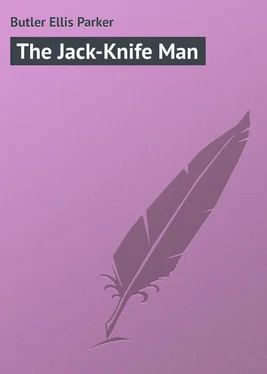Ellis Butler - The Jack-Knife Man
Здесь есть возможность читать онлайн «Ellis Butler - The Jack-Knife Man» — ознакомительный отрывок электронной книги совершенно бесплатно, а после прочтения отрывка купить полную версию. В некоторых случаях можно слушать аудио, скачать через торрент в формате fb2 и присутствует краткое содержание. Жанр: foreign_prose, на английском языке. Описание произведения, (предисловие) а так же отзывы посетителей доступны на портале библиотеки ЛибКат.
- Название:The Jack-Knife Man
- Автор:
- Жанр:
- Год:неизвестен
- ISBN:нет данных
- Рейтинг книги:3 / 5. Голосов: 1
-
Избранное:Добавить в избранное
- Отзывы:
-
Ваша оценка:
- 60
- 1
- 2
- 3
- 4
- 5
The Jack-Knife Man: краткое содержание, описание и аннотация
Предлагаем к чтению аннотацию, описание, краткое содержание или предисловие (зависит от того, что написал сам автор книги «The Jack-Knife Man»). Если вы не нашли необходимую информацию о книге — напишите в комментариях, мы постараемся отыскать её.
The Jack-Knife Man — читать онлайн ознакомительный отрывок
Ниже представлен текст книги, разбитый по страницам. Система сохранения места последней прочитанной страницы, позволяет с удобством читать онлайн бесплатно книгу «The Jack-Knife Man», без необходимости каждый раз заново искать на чём Вы остановились. Поставьте закладку, и сможете в любой момент перейти на страницу, на которой закончили чтение.
Интервал:
Закладка:
“I won’t change my mind about the boat, George,” said Peter. “Good night.”
He closed the door and bolted it.
“George means all right,” he said, settling himself to his task of reassembling his clock, “but he’s sort of coarse.”
The storm, increasing with the coming of night, darkened the interior of the cabin, and Peter lighted his lamp. As he worked over the clock the drizzle turned into a heavy rain through which damp snowflakes fluttered, and the wind strengthened and turned colder, slapping the rain and snow against the small, four-paned window and freezing it there. It was blowing up colder every minute and Peter put his handful of coffee in his coffee-pot and set it on the stove to boil while he completed his clock job. He tested the clock and found that if he set the alarm for six o’clock it burst into song at seventeen minutes after three. A thin smile twisted the corners of his mouth humorously.
“You skeesicks! You old skeesicks!” he said affectionately. “Ain’t you a caution!” He set the clock on its shelf where it ticked loudly while he drew his table closer to the bunk, his only seat, and put his coffeepot and tin cup on the table.
“Well, now,” he said cheerfully, “as long as there ain’t anything to eat I might as well whet up my jack-knife.”
He whetted the large blade of his knife while he sipped the coffee. From time to time he put down the tin cup and tried the blade of the knife on his thumb, and when he was satisfied it was so sharp any further whetting meant a wire edge, he took a crumpled newspaper from under the pillow of his bunk and read again the article on the increased demand for chinchilla fur, but it had lost interest. The wind was slapping against the side of the boat in gusts and the frost was gathering on his windows, but Peter replenished his fire and lighted the cheap cigar George Rapp had left on the clock shelf.
What does a hermit do when he is shut in for a long night with a winter storm raging outside? Peter put his newspaper back under the pillow and hunted through his driftwood for a piece that would do to whittle, but had to give that up as a bad job. Then his eyes alighted on the wooden pegs on which his shot-gun lay, and he took down the gun and pulled one of the pegs from its hole. He looked out of the door, to see that his line was holding securely, and slammed the door quickly, for the night was worse, the rain freezing as it fell and the wind howling through the telegraph wires. With a sigh of satisfaction that he was alone, and that he had a snug shanty-boat in which to spend the winter, Peter propped himself up in his bunk and began carving the head of an owl on the end of the gun peg, screwing his face to one side to keep the cigar smoke out of his eyes. He was holding the half-completed carving at a distance, to judge of its effect, when he heard a blow on his door. He hesitated, like a timid animal, and then slipped from the bunk and let his hand glide to the shot-gun lying on his table. Quietly he swung the gun around until the muzzle pointed full at the door, and with the other hand he grasped his heavy stove poker, for he knew that tramps, on such a night, are not dainty in seeking shelter, and he had no wish to be thrown out of his boat and have the boat floated away from him.
“Who’s out there?” he shouted, but before he could step forward and bolt the door, the latch lifted and the door, forced violently inward by a gust of wind, clattered against the cabin wall. A woman, one hand extended, stood in the doorway. Her face was deathly white, and her left hand held the hand of a three-year-old boy. This much Peter saw before the flame of his lamp flared high in a smoky red and went out, leaving utter darkness.
II. PETER’S GUESTS
COME right in, ma’am,” said Peter.
“Step inside and close the door. Nobody here’s going to hurt you. I’ll put my shoes on in a minute – ”
He was feeling for the matches on his clock shelf, but he hardly knew what he was doing or saying. The ghastly white face of the woman was still blazed on his mind.
“Excuse me for being bare foot; I wasn’t looking for callers,” he continued nervously, but he was interrupted by the sound of a falling body and a cry. He pushed one of the stove lids aside, letting a glare of red light into the room. The woman had fallen across his doorsill and lay, half in and half out of the boat, with the boy crying as he clung to her relaxed fingers.
“Don’t, Mama! don’t!” the small boy wailed, not understanding.
Peter stood, irresolute. He was a coward before women; they drove his wits away, and his first wild thought was of flight – of leaping over the fallen body – but, as he stood, the alarm-clock, after a preliminary warning cluck, burst into a loud jangling clatter and the boy, sore frightened, howled with all his strength. That decided for Peter.
“There, now, don’t you cry, son!” he begged, on his knees beside the boy in an instant. “Don’t you mind the racket. It ain’t nothing but my old funny alarm-clock. She goes off that way sometimes, but she don’t mean any harm to anybody. No, sir! Don’t you cry.”
The boy wailed, more wildly than ever, calling on his mother to get up.
“Don’t cry, your ma will be all right!” urged Peter. “That clock will stop right soon, and she won’t begin again – not unless she takes a notion.”
The clock stopped ringing abruptly, the boy stared at it open-mouthed.
“That’s a big boy!” said Peter approvingly. “And don’t you worry about your ma. I guess she’ll be all right in a minute. You go over by that stove and warm yourself, and I’ll help your ma in, so this rain won’t blow on her.”
Peter led the boy to the stove, and lighted his lamp. He put the peg back in the wall, and placed the gun behind the boy’s reach before he turned to the woman.
She was neither young nor old, but as she lay on the floor she was ghastly white, even in the glare from the smoking oil lamp, and her lips were blue. Her cheap hat was wet and weighted down with sleet, and the green dye from the trimmings had run down and streaked her face. She was fairly well clad, but not against the winter rain, and her shoes were too light and too high of heel for tramping a railway track. Peter saw she was wet to the skin. He bent down and with his knee against her shoulder moved her inside the door and closed it.
“That’s hot in there,” said the boy, who had been staring into the glowing coals of the opened stove. “I better not put my hand in there. I’ll burn my hand if I put it in there, won’t I?”
“Yes, indeedy,” said Peter, “but now I got to fix your ma so’s she will be more comfortable.”
“I wish I had some liquor or something,” he said, looking at the woman helplessly. “Brandy or whisky would be right handy, and I ain’t got a drop. This ain’t no case for cold water; she’s had too much cold water already. I wonder what coffee would do?”
He put his coffee-pot down among the coals of his fire and while he waited for it to heat, he drew on his shoes.
“I guess your ma will feel sort of sick when she wakes up,” he told the boy, “and I guess she’d be right glad if we took off them wet shoes and stockings of yours and got your feet nice and warm. You want to be ready to help look after your ma. You ain’t going to be afraid to let me, are you?”
“No,” said the boy promptly, and held out his arms for Peter to take him. He was a solid little fellow, as Peter found when he picked him up, and his hair was a tangled halo of long, white kinks that burst out when Peter pulled off the red stocking-cap into which they had been compressed. From the first moment the boy snuggled to Peter, settling himself contentedly in Peter’s arms as affectionate children do. He had a comical little up-tilt to his nose, and eyes of a deeper blue than Peter’s, and his face was white but covered with freckles.
Читать дальшеИнтервал:
Закладка:
Похожие книги на «The Jack-Knife Man»
Представляем Вашему вниманию похожие книги на «The Jack-Knife Man» списком для выбора. Мы отобрали схожую по названию и смыслу литературу в надежде предоставить читателям больше вариантов отыскать новые, интересные, ещё непрочитанные произведения.
Обсуждение, отзывы о книге «The Jack-Knife Man» и просто собственные мнения читателей. Оставьте ваши комментарии, напишите, что Вы думаете о произведении, его смысле или главных героях. Укажите что конкретно понравилось, а что нет, и почему Вы так считаете.












